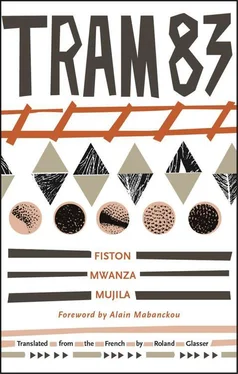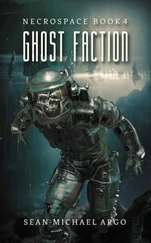It is said that once diggers are underground they sing songs with magic words, for several reasons: 1) To alert the deities in the event of a cave-in. 2) To shoo away the spirits of those previously entombed in the vicinity and who show up to disturb public order — Mortal Combat shared the opinion that it’s the bodies that procreate the stones: “It requires men to shed their blood so that we can live off the propagated stones.” 3) To find the strength to smash everything. 4) To wish for an abundant harvest from these deities.
A few moments after this ritual, the picks and shovels began their plaintive tune. They’d smoked grass beforehand. This was recommended in the City-State for long, drawn-out jobs. Mortal Combat, his breath stinking of the Tram restrooms, struck hard.
“Go stand guard,” Requiem urged Lucien, before launching into an account of Jean Gabin’s first film. The tunnel walls splintered around them. Dysentery and Los Caballeros, who’d come from Cuba on the trail of their ancestors, piled up the merchandise. Like a captain in the midst of battle, sitting and occasionally standing on a mound, Requiem harangued his troops, larked about, jawed away. He was renowned for this; one of the things that earned him the title of Colonist was his capacity to make you work till you lost consciousness. “Go on, smash it, score a goal, don’t you despair, go on!” Lucien came and went, asking them to strike camp. “It’s noisy,” he said.
“What’s a weapon for?” the Negus retorted. “Let them come, they should learn you don’t climb on the bandwagon, the Neanderthals! RULE NUMBER 20: cocksuckers exist to suffer fuckups. Let them come!”
They were equipped with only a single torch. Real moles, they smashed, bashed, and hounded the stone by intuition. Requiem, who had a fine touch, ran his hands over the earth and rock, and gave directions.
“Left, right, no that’s low-grade, stick with it, guys!”
And to lighten the atmosphere, he recounted his first days in the City-State. A native of the other bit, the former country, he had come to the City-State to bury the pain of his shattered love.
He abandoned his studies for military service around the time the dissident General and his brothers started attacking the country, or what had been the country. Thanks to his ethnic origin, somebody gave him a hot tip. He had nothing to lose because the army was recruiting university students, who would now attend lectures and courses in other climes. One thing led to another, and after much thought, he joined the army without saying a word either to Lucien, his best friend, or to Jacqueline, his wife. He contented himself with sending just a postcard, twelve months after he left. Following service in Israel and Angola, he returned with the rank of lieutenant colonel.
He refused visitors. One day Lucien even undertook to go see him at general headquarters to inform him that Jacqueline, Requiem’s own wife, was going through a rough time, with no money for the rent, no cash, nothing to feed his son, his dying son. Requiem ordered Lucien to be given a beating and incarcerated. “That’ll teach him to stick his nose into other people’s lives,” he’d said.
In the meantime, the dissident rebels attacked and seized two small towns. Requiem was therefore among the officers sent to the various fronts. According to the word on the street, Requiem and his brothers-in-arms, including the notorious child-soldiers, raped, looted, and massacred. There was talk of a soldier, a senior officer, who had sold out. To sell out means providing information to the enemy, siphoning off the men’s rations and embezzling their pay, and sending soldiers to their death by dint of changing sides.
The first rumors of his death arrived one October morning. Jaby, who’d returned to us from this war with second-degree burns, even guaranteed that before his death, the Negus had said that Lucien should take care of Jacqueline. But the same Jaby corrected his assertions. Requiem had actually said: “Lucien has stabbed me in the back!” Several months later, there were echoes that the Negus was still alive. Jaby apologized and claimed he had simply confused his face, explaining, “Over there, when the blood starts running you lose all sense of time, you forget yourself, everyone looks like one and the same person, you shit your pants, you can’t see anymore, and you find yourselves, like Siamese twins, waiting for death, and so when someone buys it, well, you get confused, right!”
In the meantime, Jacqueline had moved into Lucien’s place.
One morning, a man appeared, thin, quite thin, sweating with every step. Face of a shipwrecked sailor. The more jittery ran to hide behind the bar.
“A ghost!” they screamed.
The crowd rushed to meet him, proffered alcohol. He refused.
“What are you looking at me like that for? Leave me the hell alone!”
They understood from his first few words that a whole era was on the turn. He wasn’t dead, he repeated over and over again. He had simply fallen ill, a heart problem. Irregular breathing, nausea, chest pains.
By his own account, ten thousand dollars was the estimated price of curing his diseased heart, including surgeries and hospitalizations, for want of a transplant which would cost the army an arm and a leg and couldn’t be carried out here anyway. The military doctors advised him to return to his family. “Your illness requires the kind of care that cannot be provided here.”
He persisted.
“I’ve lost everything. No question of returning there! Where do you expect me to go? The army is all I have left.”
He dug his heels in, but they forced him to climb aboard a banana locomotive.
Itinerary: “Your hometown!” He got off at the first station, a village of some five thousand souls.
There he found accommodation with a woman twice his age. And so began the roaming, from village to village, to get treatment. The gossip doing the rounds at the time spoke of twenty or so villages whose streets he’d trodden in hope of a cure. To return home with such shaky health was out of the question. He was very much aware of all that was happening on the other side: Lucien and Jacqueline’s life together.
After four years of this contraband life, he returned to the fold. His homecoming coincided with the secession of the City-State, an event hailed by the tourists and other diggers, who excavated even in wartime. A stone rush broke out in the region occupied by the rebels. The stone was all that mattered. Every boy old enough to carry a garbage bag jumped aboard the first locomotive. The girls old enough to peddle flesh followed suit. And were right to do so, given that the Back-Country is unfortunate in having not a single iota of underground wealth. After trying desperately to win back Jacqueline, Requiem decided in turn to make for the City-State.
They dug out seventeen sacks-worth in total. Around five in the morning, Requiem suggested they pack up, two sacks per person. Muscles straining, each managed to hoist his load onto his head, except Lucien. Mortal Combat helped him carry his burden. Five o’clock, time was flying.
Speed was of the essence to avoid getting shot in the back. The Negus led the way, Kalashnikov slung over his shoulder, haranguing them.
“I’ll shoot anyone who drops the merchandise.”
Lucien couldn’t take it anymore. He was almost sniveling. Requiem’s friends laughed up their sleeves.
“My notebook!”
He realized he’d forgotten his journal near an old boxcar, where he’d been standing guard. He excused himself to go back there but Requiem was against it.
“Help us first put most of it out of reach. After that …”
They made it out the gate. Lucien put down his load and went back into the complex. Requiem muttered behind his back:
Читать дальше












